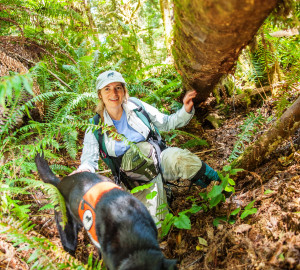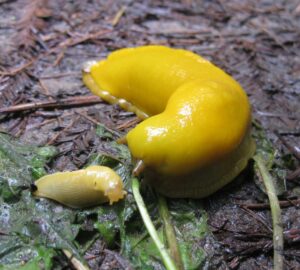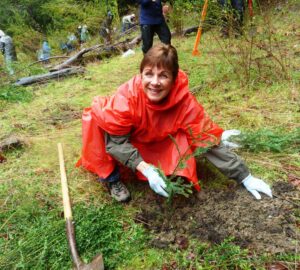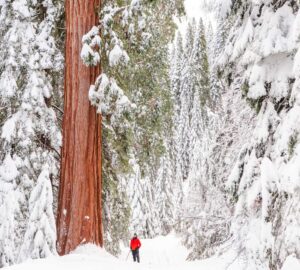
One of biologist Debbie Woollett’s star colleagues has four legs. Wicket is a Labrador mix for Working Dogs for Conservation, an organization that Woollett co-founded to apply dogs’ abilities to conservation projects.
Wicket can recognize the scents of 26 species and has “alerted” on moon bears in China, elephants in Southeast Asia, invasive snails in Hawaii, and grizzly bears and black bears in North America. In 2014, she helped in a League-sponsored project to detect white-footed voles that inhabit California’s coast redwood forests.
“Pretty much everything we do is geared to their needs,” said Woollett, about Working Dogs’ canines. “They work with us, they live with us. They’re a big part of our personal lives as well as our professions.”
Watching Woollett interact with Wicket is like watching two dancers move effortlessly through their paces. As Wicket snoops through the undergrowth in quest of white-footed vole scat scent, Woollett follows, occasionally directing the dog to a specific clump of vegetation. Woollett doesn’t so much command Wicket as coax her: “This way, Wicket. Come back, check this.” There is a seamlessness, a unity to their activity that speaks of a deep and abiding bond.
At irregular intervals, Wicket stops in what could be interpreted as a heroic pose, with head held high and nose quivering. But she isn’t primping or posturing, Woollett said: She’s processing.
“You can really see her brain working,” Woollett laughed. “These dogs aren’t playing. They’re working hard and they’re thinking hard. This kind of activity can really wear them out, so we have to monitor them to make sure they don’t get too tired.”
“When one of our dogs hits on a target, it gets a reward,” Woollett said, gently scratching between Wicket’s ears. “For Wicket, it’s a chance to play with her favorite ball. She’s doing her job.”








